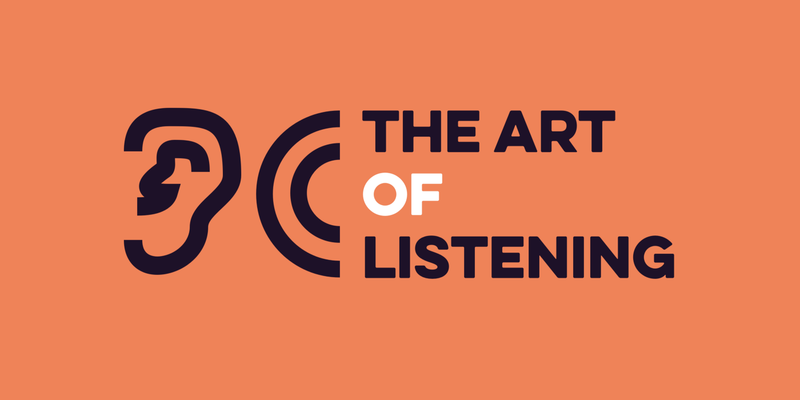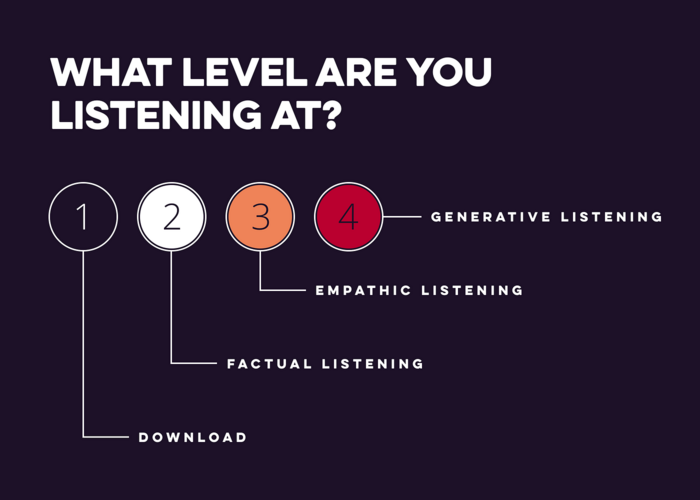Listening is probably the most underrated leadership skill and yet a skill every leader must master.

Listening defined
Otto Scharmer, senior lecturer at MIT, describes four levels of listening: downloading, factual, empathic and generative. By focusing on listening, Scharmer wants us to open our mind, heart and will in a balanced and holistic way. At level one, downloading, listening is limited and reconfirms what we already know. Nothing new emerges in our mind. We listen to our own inner voice and thoughts. We are not really present. Our minds are occupied elsewhere.
At level two, factual listening, we are open to listening to facts and information and notice new information. Doing this requires opening the mind — that is, the capacity to suspend our habit of judgment. We listen to what the person is actually saying, but without focusing on their feelings or emotions, or the nuance of the conversation. At the third level of listening, empathic listening, we see the situation through the eyes of another. We have to use our feelings and our heart as conduits for tuning in to another person’s view. We put ourselves in the shoes of the other person. Finally, at level four, generative listening, we listen with an open mind. Here we listen while holding space for something new to be born. The listener connects deeply with the core ideas of the conversation and starts seeing the best possible futures ahead.

When listening is not enough
During the past year I studied to become a coach by following a course at Georgetown University. This has challenged me to shift my mode of listening to a deeper level. I can assure you, that while it seems to be a small change, active listening can be life-changing and make a huge difference.
As a leadership coach, I do my best to listen at many levels, but listening alone is never enough. Asking the right questions is vital. I try to understand what is the meaning behind the story. What are the values, the purpose, the feelings? Is there resistance, fear, hesitation? Is there a deeper issue? What is the person not saying?
Gently challenging old assumptions, examining one’s mindset, asking the person to see things from a different perspective is vital to prompt discovery and insight. It comes down to this: good listening requires a two-way conversation. I try to make sure the person I am listening to knows I am empathetic, trying to help. I try to provoke the person to move beyond their current thinking by asking questions to open new paths and new ways of thinking. When this happens, I see the sun shining in the face of the person I am talking to as we discover new paths of thinking. I avoid making suggestions but rather keep on asking questions.
To start a practice of deeper listening yourself, try to scale the ladder of listening to enter into generative listening. Try to really listen, put yourself in the other person’s shoes, and open yourself up to all the possibilities this holds. It takes practice. At the end of your conversation, ask yourself, what was my level of listening.
Listening — taking me home
Good listening reminds me of the sponges on my Greek home island Symi. Symi is famous for its sponges and brave sponge divers. Throughout the last century they were exported all over the world. When one listens, one needs to absorb everything being said — without judgement. Sponges are only found in deep, dark levels of the sea, hence listening needs to be at a deep level. Listening, like sponges, can help one to cleanse, to reach a deeper layer of truth and self-discovery. Ultimately, it can lead to growth and creation. As you can see, with spring in the air, my mind is already thinking of beautiful Symi.
When one listens, one needs to absorb whatever is said without judgement.
My entire life has been devoted to humanitarian action, having supported and led operations in countries in Africa and the Middle East. During the past three decades. I have worked under some of the most inspiring leaders. I have spent my career studying these role models who are both leaders and team players, whose approach to leadership has led to measurable improvements in the lives of people we serve. In fact, serving people in need of humanitarian support has motivated my entire career. Their resilience, courage and humanity are a constant source of inspiration.
This is my first blog in my current capacity heading the Global Executive Leadership Initiative — GELI. I will be sharing my experience and thoughts on leadership issues affecting individual leaders, teams and the system in our sector. My ears, eyes and heart will be open as I listen to your feedback on my exploration of leadership.






